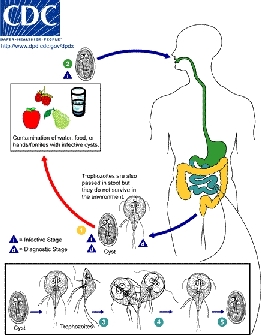| Giardiasis
and Cryptosporidiasis |
 |
|
|
This information was in part summarized from
Health Canada
(December 2013) |
| General Information |
-
Giardia
and
Cryptosporidium are microscopic,
protozoan parasites that can be found in water contaminated with
the feces of infected animals.
-
Giardia
is often found in human, beaver (Castor
canadensis), muskrat (Ondatra
zibethicus), and dog feces. Cattle feces appear to be the
primary source of Cryptosporidium, although these parasites
have also been found in humans and other animals. Drinking water
sources become contaminated when feces containing the parasites are
deposited or flushed into water.
-
In humans, Giardia causes an intestinal illness
called giardiasis or "beaver fever". Cryptosporidium is
responsible for a similar illness called cryptosporidiosis.
-
Giardia
and Cryptosporidium parasites
produce
cysts
that are very resistant to harsh environmental conditions. When
ingested, they germinate, reproduce, and cause illness. After
feeding, the parasites form new
cysts,
which are then passed in the feces. Studies have shown that
ingestion of only a few
cysts
will cause illness in humans.
|
| Life Cycle of Giardia |
|
Click on image to enlarge. |
 |
Cysts are resistant
forms and are responsible for transmission of giardiasis. Both
cysts and trophozoites can be found in the feces (diagnostic
stages)
 . The cysts are hardy and can survive several months in
cold water. Infection occurs by the ingestion of cysts in
contaminated water, food, or by the fecal-oral route (hands or
fomites) . The cysts are hardy and can survive several months in
cold water. Infection occurs by the ingestion of cysts in
contaminated water, food, or by the fecal-oral route (hands or
fomites)
 . In the small intestine, excystation releases
trophozoites (each cyst produces two trophozoites) . In the small intestine, excystation releases
trophozoites (each cyst produces two trophozoites)
 . Trophozoites multiply by longitudinal binary fission,
remaining in the lumen of the proximal small bowel where they
can be free or attached to the mucosa by a ventral sucking disk . Trophozoites multiply by longitudinal binary fission,
remaining in the lumen of the proximal small bowel where they
can be free or attached to the mucosa by a ventral sucking disk
 . Encystation occurs as the parasites transit toward
the colon. The cyst is the stage found most commonly in
nondiarrheal feces . Encystation occurs as the parasites transit toward
the colon. The cyst is the stage found most commonly in
nondiarrheal feces
 . Because the cysts are infectious when passed in the
stool or shortly afterward, person-to-person transmission is
possible. While animals are infected with Giardia, their
importance as a reservoir is unclear. . Because the cysts are infectious when passed in the
stool or shortly afterward, person-to-person transmission is
possible. While animals are infected with Giardia, their
importance as a reservoir is unclear. |
|
| Signs and Symptoms |
-
Gastrointestinal
upset,
malaise, and weight loss are the most common symptoms caused
by Giardia. Vomiting, chills, headache, and fever may also
occur. These symptoms usually surface 6 to 16 days after the initial
contact and can continue as long as a month.
-
The
symptoms of cryptosporidiosis are similar; the most common include
watery diarrhea, abdominal cramps, nausea, and headaches. These
symptoms occur within 2 to 25 days of infection and usually last one
or two weeks; in some cases they may persist for up to a month.
|
| Treatment and
Risk Reduction |
-
If water purification
is inadequate, drinking water may contain sufficient numbers of
parasites to cause illness. Other sources include direct exposure to
the feces of infected humans and animals, eating contaminated food,
and accidental ingestion of contaminated recreational water. The
comparative importance of these various routes of exposure is
unknown.
-
Giardia
is usually cleared from healthy people without treatment within a
month. Anti-parasitic drugs are available and are particularly
helpful for immunocompromised people in whom the illness could
otherwise develop into a persistent state.
-
Cryptosporidium
also will usually disappear from healthy people within a month
without treatment. Anti-diarrheal drugs and rehydration therapy may
be used if diarrhea becomes severe. No drugs to fight the illness
have been approved, although many are currently being tested.
-
Both parasites, but
particularly Cryptosporidium, can pose a more serious threat
to immunocompromised people, such as those living with AIDS or
cancer, or transplant patients receiving immunosuppressive drugs.
For these people, the symptoms are more severe and can be life
threatening. It is presently unknown whether immunocompromised
individuals are at greater risk of contracting giardiasis or
cryptosporidiosis than the general public. Nevertheless,
immunocompromised individuals should discuss these risks with their
physicians.
-
People who wish to take extra precautions can
boil their water for one minute to kill any parasites that may be
present. This practice will also destroy any other microorganisms
that might be of concern to these individuals. As bottled water is
not routinely monitored for Giardia and Cryptosporidium,
its suitability as an alternative to boiled tap water is unknown.
-
If you are suffering from
diarrhea and suspect that your symptoms may be due to Giardia
or Cryptosporidium, visit your physician and mention any
exposure you may have had to water, food, or feces that could have
been contaminated by the parasites.
|
| Further Reading |
|
|
|
|

